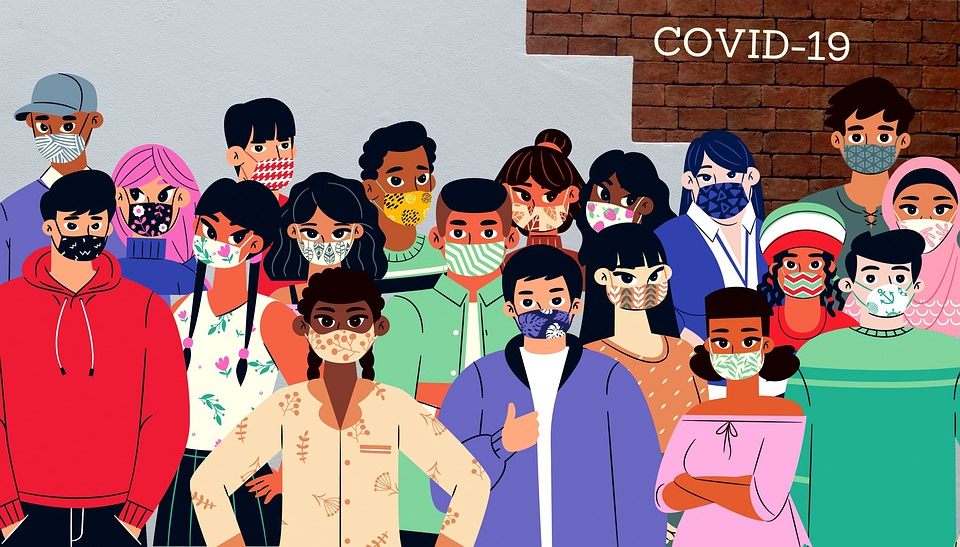
Who among us hasn’t marveled over Nancy Pelosi’s face masks and even wondered where she finds them? The speaker of the house shows up in news clips, one after another, wearing face masks that underscore her individuality and fashion sense.
Just as she once donned a red coat and pair of sunglasses to celebrate a face-off with President Donald Trump, Pelosi now uses her face masks both for personal and political expression.
Fashion mags report that the speaker buys her masks from Donna Lewis, a small boutique located in nearby Alexandria, Va. Owner Chris Lewis unscored the Nancy-effect, reporting that “when Nancy wears it, we sell out.” The boutique’s masks are stitched by hand from Italian prints and sell for $22 apiece.
Pelosi’s mask purveyors are not alone in recognizing that masks have become the latest fashion accessory with name designers showing high-end designs. There are Gucci masks, embroidered masks, “Princess Di” masks and masks that make political and even social statements. Of the dozen masks I’ve accumulated (most handmade by my friend Linda Kelly), I have one that memorializes justice Ruth Bader Ginsburg and another that merely demands: “Vote!”
One designer, quoted in the New York Times, said, “I think people look at masks the same way they look at handbags, shoes and scarves.” Since the first thing one sees is someone’s face, it stands to reason that people are searching for masks that are unique and not lost in a sea of blue and white disposable masks.
Masks, some fashionable, others functional, and still others medically approved, are the mark of the pandemic. And with covid-19 variants rampant, masks are likely to be around for some time to come.
Facing the surge of infection, Washington Gov. Jay Inslee on Aug. 28 issued his latest statewide mask mandate. Masks are now required in indoor public spaces, all public buildings and for large outdoor events. Inslee, like many of his fellow Democratic governors, has been following Center for Disease Control recommendations. Early on, CDC identified protective face coverings as one of the most effective measures at reducing risks of contracting the virus and spreading it to others. The CDC advised masks for anyone in schools including staff, students and visitors.
Yet, despite widespread reliance on masking, masks — like vaccinations — have become a flash point of contention across the nation. In Washington alone, mask mandates have fueled rallies, demonstrations and unruly confrontations. An Aug. 24 Franklin County Commission Meeting was hijacked by an unmasked crowd fronted by Commission Chair Clint Didier. A perennially unsuccessful candidate for office, Didier defied the governor’s mask mandate citing “an unalienable right given by our creator God” and contending that “what God has granted no governor or president can take away.”
Then on Sept. 3, a right-wing group led by the Proud Boys tried to force entry unmasked into Vancouver’s Skyview High School. That resulted in lockdowns at nearby schools and prompted Superior Court Judge Susan Clark to grant an injunction prohibiting protests and demonstrations “disrupting educational services” within a mile of local schools until the end of the mask mandate.
Meanwhile, school board meetings have been torn asunder by parents opposed to school mask mandates. At demonstrations, parents carry signs with hand-lettered messages that read, “Masking kids equals abuse” and “Medical Choice: Your Body Your Choice.” Protesters chant “U.S.A.” They cry “Children Not Politics.” One anti-anti-masker confronted a group of demonstrators, saying, “You can be replaced, children cannot.”
Mask meltdown has surfaced throughout the nation, not just in states with mask-phobic governors like Texas and Florida. Deep divisions show up despite a recent Axios survey that showed that more than 60 percent of Americans support school mask mandates. But within that majority, Axios discovered a deep split: 85 percent Democratic, but only 32 percent of Republicans support mask mandates. There also are gender differences with more moms than dads (66% vs. 50%) supporting masks.
For the foreseeable future, masks are with us, no matter that they seem such an implausible bone of contention. It’s easy to conclude that never before (not even during the 1919 flu outbreak) has a piece of flimsy fabric taken on such broad, far-reaching significance — on one hand adopted as a fashion statement and on the other sparking such outrage.
Discover more from Post Alley
Subscribe to get the latest posts sent to your email.

It seems to me that using a mask to make a political statement just adds fuel to the fire. The mask alone says all that needs to be said, without adding additional reasons for a dissenter to dissent.